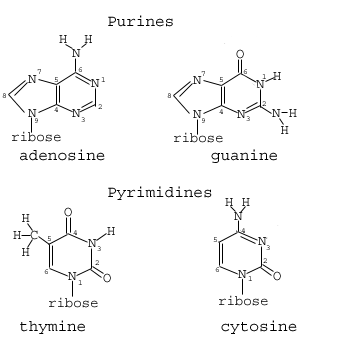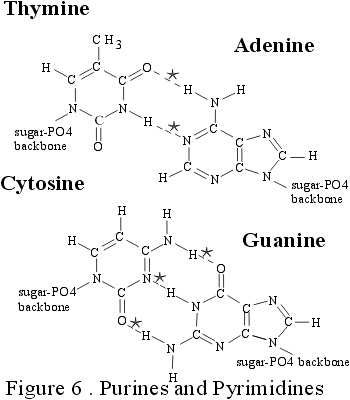Third Lesson: DNA overview
Now that
we have discussed chemical bonding, we have a solid footing to
begin discussing the fundamentals of molecular biology. In this
lesson I am going to discuss DNA. DNA serves as probably the most
important concept in molecular biology, because it defines all important
biological processes.
DNA
stands for Deoxyribonucleic acid. Francis Crick and James Watson
were credited with the discovery of DNA, and received the Nobel Prize
in Medicine or Physiology in 1962. DNA is described as two long
strands wrapped around each other to form a long double-helix
The building blocks of DNA are called nucleotides. There are two categories of nucleotides: pyrimidines and purines. Furthermore, there are two types of pyrimidines used in DNA, and these are cytosine and thymine. There are two types of purines used in DNA, and these are adenine and guanine.
The building blocks of DNA are called nucleotides. There are two categories of nucleotides: pyrimidines and purines. Furthermore, there are two types of pyrimidines used in DNA, and these are cytosine and thymine. There are two types of purines used in DNA, and these are adenine and guanine.
A given
adenine nucleotide found on one strand of DNA will form two hydrogen bonds with
a thymine nucleotide on the opposite strand and vice versa. Likewise, a
given guanine molecule found on one strand of DNA will form three hydrogen
bonds with a cytosine molecules on the opposite strand and vice versa.
The unique way all the nucleotides pair together leads to the formation of the
double-helix.
The
importance of DNA lies in the unique sequence that the nucleotides are arranged
in on the strands of DNA. Every living thing on the planet’s distinctive
linear sequence of nucleotides makes that organism what it is. Humans,
bacteria, plants, etc. all are defined by DNA sequences. Within DNA there
are important areas that encode and define how to make all the biological material
in the world. These areas are called genes. There are two processes
involved in which gene sequences on DNA are converted into the functional biological products that do the “work” of molecular biology. First
Transcription followed by Translation, which I will be discussing in the next
upcoming lessons.



No comments:
Post a Comment